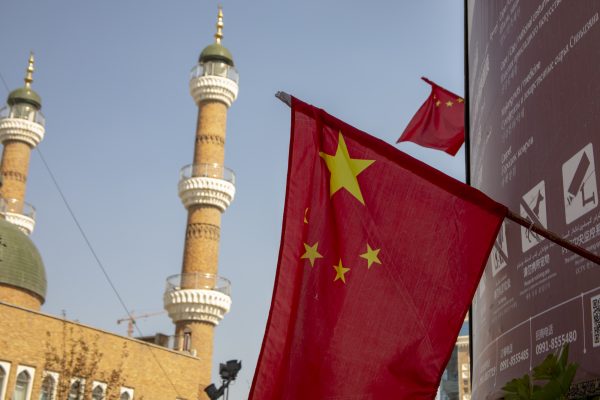Drowning “Joint Contribution and Shared Benefits” in South China Sea
Continuing to take toll of environment and bio-diversity, as they did in Africa;
Chinese companies’ operations in Indonesia have become a hazard for country’s
environment. In an utter disregard to the delicate local environment, these
companies have been exploiting the natural resources of Indonesia, disturbing
its ecological equilibrium. Their activities have not only threatened the flora and
fauna, but the indigenous population causing their displacement.
Batang Toru Forest of Indonesia’s Sumatra Island has been home to roughly 800
Sumatran Orangutans, on the ‘Critically Endangered Species’ list. Furthermore,
environmentalists argue that the project threatens the Sumatran tiger and Sunda
pangolin. These already endangered species have come under threat due to the
construction US$ 1.6 billion Batang Toru Hydro-Power Project, under China’s
ambitious Belt & Road Initiative (BRI), by China’s Sino Hydro Corporation
Limited. Significantly, while the Asian Development Bank and International
Finance Corporation declined to fund the project due to environmental concerns,
the Bank of China funded it.
The site of the Project is located near a fault line, a concern not mentioned in its
environmental assessment, but raised by the Indonesian Forum for the
Environment (WALHI). Moreover, the Hydroelectric Power Project has been
rated as the riskiest environmental project in history by scientists who have
approached Indonesian President Joko Widodo for the protection of Batang Toru
Forest. Besides, the threat to wildlife in the region, the proposed dam would
adversely impact the livelihood of over 100,000 people downstream.
On the other hand, President Xi, in his speech at the Boao Forum (April 2021)
for Asia Annual Conference had stated “We will follow the principles of extensive
consultation, joint contribution and shared benefits, and champion the philosophy
of open, green and clean cooperation, in bid to make Belt and Road development
high-standard, people-centered and sustainable”. However, Chinese double
standards of sustainable development through the BRI are obvious as Chinese
activities while developing zinc mine in Northern Sumatra, the Jakarta-Bandung
High-Speed Rail and the Probolinggo-Banyuwangi highway have been
destroying the environment in the country.
PT Dairi Prima Mineral Project (DPM), in which China Nonferrous Metal Mining
Group has majority stakes, is going ahead with US$ 630 million zinc mining
project. The project is within a few hundred meters of the villages Sopokomil and
Parongil and lies in the seismic zone. Most of the nearby residents are indigenous
farmers and have raised concerns about likely rising acidity of soil due to
sulphuric acid, generated as by-product of the mining operations.
The construction of the tailings dam has to be carried out to manage the waste
slurry of the mining activities too has the potential to wreak environmental havoc
to the area. A study published in the Geotechnical News in 2010 found thattailings dams fail at a rate of about 100 times greater than that of conventional
water retention dams, rendering the PT Dairi Prima Mineral project vulnerable,
even after the closure of the mine. To quote from Dr. Richard Meehan, “a failure
is as likely to occur even 100 years after the project has been ‘closed’.”
According to the earth.org, there are also issues of accountability and
transparency of the Mineral project, with doubts on the amount of autonomy
given to the Chinese company. The local communities are up in arms for their
rights even at international platforms, such as Compliance Advisor Ombudsman
under the World Bank, emphasizing the need to taking into account the societal
and environmental costs of the project.
Separately, China’s Tsingshan Group is constructing a US$ 700 million nickel-
based processing plant at the Morowali Industrial Park under the BRI. The project
threatens nearby Indonesian marine life. A US$ 165 million Probolinggo-
Banyuwangi highway project being carried out by the China Communications
Construction also lies on an active Wonorejo fault. Notably, China, to ‘reform
Buddhism’, has been notoriously destroying Buddhist Statues in Tibet, claiming
that they stood over seismic zone, continues to build multi-million dollar projects
in earthquake prone areas.
Perhaps the most glaring example of Chinese insensitivities towards the local
concerns is handling of the Jakarta-Bandung High-Speed Rail project which is
engulfed in controversies due to poor management and environmental concerns.
The project has led to forced evictions, flooding, and degradation of farmland.
Amid strong public perception against the project, environmentalists argue that
the Chinese company involved has blatantly ignored major red flags related to
the project’s design, sustainability, and legal compliance.
According to a report of ‘The Diplomat’, Chinese proponents of the railway never
published their feasibility studies. Indonesian law requires that an environmental
impact assessment for a project of this size to take 12 to 18 months. This,
surprisingly, was completed in seven days, neglecting key analysis about the
project’s likely impacts in terms of landslides, water catchment areas, and faults.
Most Chinese-funded projects being implemented in Indonesia lack
environmental safeguards and involve obsolete and inefficient technology,
causing hazard to the environment. China continues to disregard local
population’s sensitivities while pursuing its economic ambitions through the BRI
in utter disregard to Xi Jinping’s ‘green and sustainable development’ drowning
Xi’s concept of ‘joint contribution and shared benefits’ in the South China Sea.













